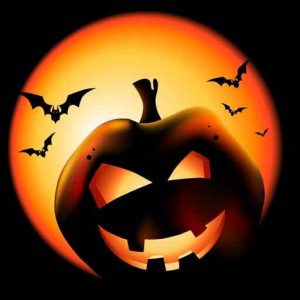Why is the apostrophe there?
The answer is that I like it. The original name for Hallowe’en was the Eve of All Hallows, so it used to have a “v”: Hallows Even (think “evening”). When the “v” disappeared, an apostrophe was substituted (the same thing we do when we contract did not into didn’t).
“Hallow” is an old word for “holy” that you can still hear in the Lord’s Prayer: “Hallowed be thy name.”
I often hear “hallow” pronounced like the word “hollow.” But if you know the history of this holiday, you’ll be careful with that a: Hallowe’en.
Here’s a brief account of how Hallowe’en got started. The Christian calendar designates November 1 as All Saints Day. Churches hold special celebrations to honor all the holy people who lived in earlier times.
Christians used to believe that on the evening of All Saints Day (October 31), the spirits of the dead came back to Earth. Those who were not-so-holy used their visiting time for pranks. Hence it became an ideal time for unruly adolescents to create all kinds of mischief: Any resulting damage could be blamed on the dead.
Over time, All Hallows’ Eve evolved into Hallowe’en. Or Halloween, minus the apostrophe.
Both are correct. I often use the apostrophe because I like the idea that our language still has hints of its history embedded in the spelling of some of our words.
But here’s the thing: If I were writing professionally, I would probably omit the apostrophe so that I’d be consistent with what other contemporary writers are doing.
English usage isn’t as cut-and-dried as many people think it is. Sometimes we’re allowed to make choices. I think it’s important for writers to be able to explain the reasons for their choices (as I just did).
Happy Hallowe’en! I hope you’ll have fun today.


